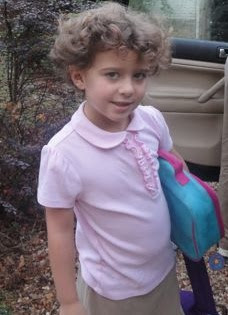“Mama, I wasn’t aggressive today at
school.”
This is usually the first thing
Margaret tells me when she comes home from school, whether or not it’s true.
She is in third grade, and she wants to believe what she says, so she presents
it as true. I want to believe her, but I check her behavior sheets to be sure.
The sheets come home everyday.
If they are filled with frowning faces,
I know it’s been a rough school day, the teachers dealing with a child who
refuses to do her work, refuses to cooperate or listen, who says rude things to
her classmates, who sasses the teacher and who may make another child cry with
cruel comments.
If the sheets have smiley faces,
break out the champagne. I am grateful and relieved that another child isn’t
telling her mother or daddy, “That blond girl Margaret slapped/kicked/pushed me
today. Or made me cry. Or said I smelled because I have black skin.”
I don’t know why Margaret slaps
other children or her teachers. It’s not a fist, and it doesn’t hurt, but
touching another person isn’t allowed. Especially not in anger. She doesn’t
know either, but we continue to try and coach her to use words, not her hands,
to express her feelings. I know why she says mean things to African American
boys, but she is working on seeing them for who they are on the inside, not for
what they wear on the outside.
My very verbal daughter can’t find
the right word to apologize? I find that difficult to believe. She loves new
words. Ubiquitous. Marvelous. Exquisite. She repeats the words over and over,
testing and tasting them. Repentance. Anguish. Sorrow. These don’t work as well
for her.
I don’t understand Margaret’s
reasoning abilities at all. When I tell her she hasn’t earned a trip to the
library, but her sister has, why does she blame her sister for my decision? She
once told me that Clara was the most powerful person in our house. Yes, a
nine-year-old is calling the shots. How does she come up with these ideas?
But on some days, Margaret acts
like the person I hope she will become. She is thoughtful, kind and insightful.
And non-judgmental.
We had one of those days earlier
this week. We had walked to our neighborhood grocery store to buy hamburger
buns. A mom was pushing a stroller with a baby in the jump seat. A protective
pad covered the seat, and there was a catheter snaking out of his short pants into
a bag in the cart itself. He wore an oxygen necklace in his nose. His arms and
legs were pencil thin and his fingers seemed to have spasticity. His face was
so tense, he looked like he was counting out a difficult financial transaction.
Margaret didn’t see the toddler’s problems,
didn’t see the fatigue on his mother’s face, the cautious way she looked at
other people who were staring at her son. “Hey,” said my girl, “Cute baby. Did
he drop this?” and she handed the mom a toy that had fallen from the cart. “Have
a good day!” The mom smiled, then looked at me and smiled even wider.
Outside the store, I wiped away a
few tears and gathered Margaret into my arms and hugged as tightly as I could,
something she loves. “My darling girl,” I said. “You are perfect. I love you
madly.”
“Oh, Mama. I love you, too,” she
said.






